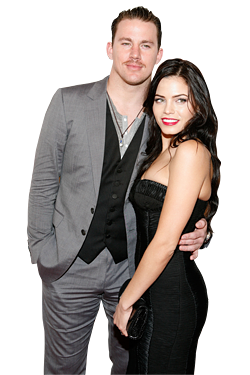
Teen heartthrobs Channing Tatum and Jenna Dewan met on the set of Step Up and married not too long after. So of course their first project since romantically break-dancing together is a documentary about the Rwanda genocide. Actually, that makes no sense at all. So we called them up to figure out how they connected with Earth Made of Glass, which was one of the strongest films to premiere at this year’s Tribeca Film Festival. It was directed by The War Tapes’ Deborah Scranton, co-produced and written by Tatum and Dewan’s pal Reid Carolin — and it might even be seen by a few teens because they’re involved.
Hi, Jenna. Most of your and Channing’s fans are young, so what’s your pitch to teens to see this movie?
Dewan: Yes, most of our fans are teenagers, or 18 to 25, but they’re curious. We Twittered about it and put up a video on Facebook, and we’ll take the documentary to a couple of different schools in New York, then probably in L.A. too. I think the less you focus on the horrible tragedy that Rwanda was and the more you focus on people rebuilding, the better. Chan and I, we’re trying to expand kids’ minds.
The documentary focuses on a few incredible individuals, like Jean-Pierre Sagahutu. In one brutal scene, he’s standing with his son by the unmarked grave of his slaughtered father, with the accomplice who murdered his father.
D: Jean-Pierre was at the premiere, and I think it was the first time he had seen the film. I think this was his first time to New York and possibly America, so he had a very out-of-body look the whole time. We heard him crying in front of us; it was just so overwhelming.
And I hear you had some fun while you were here in New York, too.
D: Yeah, I threw Chan a very low-key birthday party, and today we’re heading to Queens where he’s working today. Ha! Now my husband’s looking at me like, “Can I be interviewed now?” I’m going to pass you over to Chan.
Hey, Channing. So now you’re filming a movie in Queens?
Tatum: It’s called Son of No One, written and directed by Dito Montiel. [The two collaborated together on A Guide to Recognizing Your Saints and Fighting.] It’s about best friends growing up together, and one of them kills a guy and these two people kind of got away with it. Cut to seventeen years later … It’s got Tracy Morgan, Ray Liotta, Katie Holmes, Al Pacino, myself.
So why get involved with this documentary?
T: For me, being just some crazy kid from the South, I didn’t like watching the news. I knew of the genocide in Rwanda, but I didn’t know a lot about it. Especially to see the kids born around the genocide — to see them is to see how blessed we are. And I think a lot of Americans don’t get out of the country to go see these places. Most of my family in Alabama, some of them have never even been on an airplane and didn’t want to get on airplanes to come out for my wedding. How are they ever going to get to see these places to know how good that they have it? Maybe a movie like this.
You’ve played a lot of soldiers. Is there a relationship between those films and this one for you?
T: I guess the main thing is just ignorance. Once I started to play these soldiers and be around soldiers, it changed everything. I mean, G.I. Joe isn’t a real soldier role, it’s more like X-Men. But in Stop-Loss, I kind of had a freak-out moment because I really wanted to portray a soldier and do it well. Once I saw what it would take, I started panicking.
Why?
T: I was thinking, I don’t know if we should be trying to do this, especially right now. I was saying all these lines in front of these soldiers and thinking, I can’t feel honest about it because I know that I didn’t understand it. The fact is, that’s our job — trying to make believe. But there’s a difference between playing a lawyer and playing a soldier. They experience things that I’ll never be able to experience. I mean, I’ve been in a fist fight, but I’ve never been shot at. So I guess I wasn’t sure for a while if I could really do it — and I still don’t know if I did it. The soldiers I’ve met have put things in perspective for me that I don’t think I ever would’ve been able to see otherwise. I guess one reason I really wanted to get involved with this film was to have that same thing happen to me again.
What do you think that will be?
T: I don’t know what that’s going to be yet, but I want to go to Rwanda and shoot some footage and focus on these towns filled with kids without parents. I want to go around showing this film at schools, but I want to find my own perspective on it first, and I haven’t quite done that yet.




